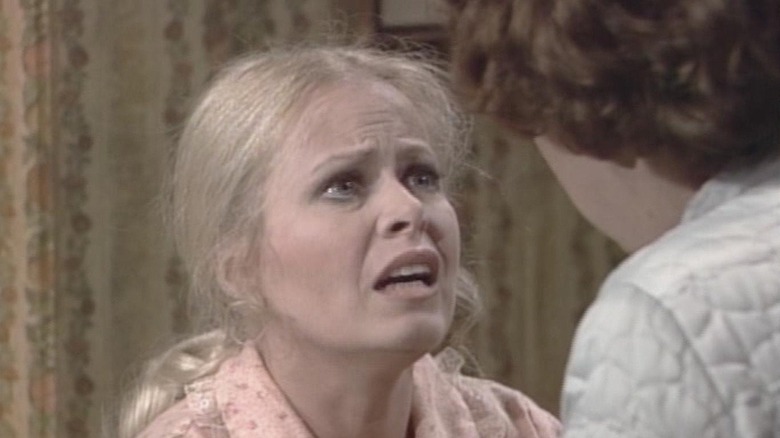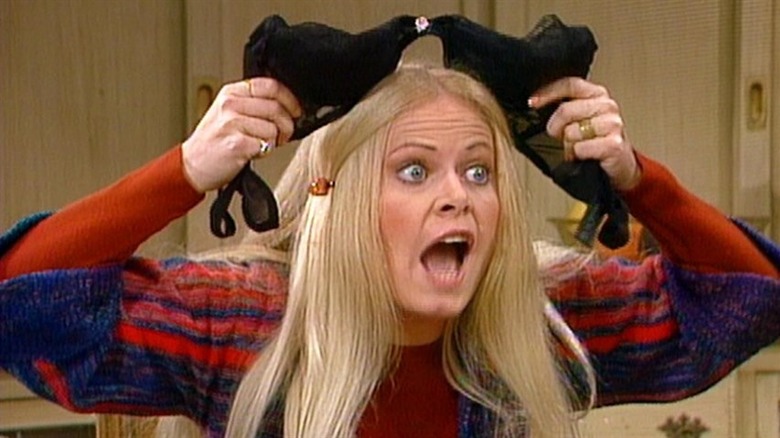How All In The Family Turned Sally Struthers' Life 'Upside Down'
The line between reality and fiction in television hasn't always been obvious to people. Be it "Gilligan's Island" viewers badgering the Coast Guard to rescue the S.S. Minnow's poor shipwrecked crew or grown-up "Sesame Street" fans believing that Sonia Manzano and Emilio Delgado (who played married couple Maria and Luis for four decades) were actually hitched, history is littered with anecdotes of audiences assuming what they're seeing on their TV screen is actually happening. Despite the leaps and gains in the masses' media literacy over time, folks still need help understanding how even docuseries and so-called reality shows can easily manipulate the truth (as creators Nathan Fielder and Benny Safdie satirized with "The Curse").
When Sally Struthers was cast as Gloria Stivic (née Bunker) in "All in the Family," she was, for all intents and purposes, a nobody. (Sally if you're reading this, know that I mean that in the most loving way possible.) Save for her stint on "The Tim Conway Comedy Hour" the year before Norman Lear's series revolutionized sitcoms in 1971, Struthers had only played minor roles, including a turn opposite Jack Nicholson in "Five Easy Pieces." Hence, when "All in the Family" exploded in popularity, Struthers was very much Gloria for real in the eyes of fans, all the way down to being married to her onscreen husband, Michael/Mike "Meathead" Stivic (Rob Reiner).
"It became apparent rather quickly that my life had completely turned upside down," Struthers told Page Six in February 2024. She specifically recalled no longer being able to get lunch with Reiner without drawing attention. More than that, there were even times when people would spot her with her actual husband and wonder why she wasn't with "The Meathead" instead. "People are so funny," she added. "They get an idea in their head, they're like an old dog with a bone."
Sitcoms got real with All in the Family
Funny as it is to think of people not getting that "Gilligan's Island" is make-believe, their confusion about "All in the Family" is more understandable. Sitcoms had never gotten as real in their portrayal of working-class Americans before, from their prejudices to the way that Gloria, Mike, Gloria's father Archie (Carroll O'Connor), and her mother Edith (Jean Stapelton) dressed and behaved. "The Bunkers came along and they flushed toilets," Struthers noted. "They didn't have good manners at the table. They reached over one another for food [...] and they talked about real things." She added:
"They peeled off the veneer. And you saw the less-than-perfect side of human beings. You saw the arguing and the vehemence and the bigotry. You can't put the genie back in the bottle now. Everything got more honest after that."
This, in turn, made it easier for people to recognize themselves in Gloria and her family. Shocking as it was to hear Archie spouting slurs and racial epithets on "All in the Family" (mind you, this was very much a case where depiction didn't equate to endorsement), it was also a more honest depiction of white Americans than other comedy series provided at the time. If viewers didn't like what they were seeing, then it was a chance for them to question why that was.
Struthers, despite the overwhelming nature of her experience, remains firmly "grateful" to this day. "And over the years the gratitude has grown because it continues to open doors," she added, including paving the way to her successful voice acting career and other beloved live-action roles (like when she played Babette Dell on "Gilmore Girls"). "All in the Family" might've been pure fiction, but its impact on Struthers' life and the television landscape was all too real.

